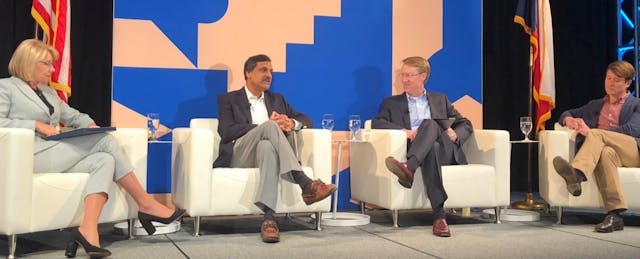Education Secretary Betsy DeVos made a last-minute appearance at SXSW EDU on Tuesday, calling for a “rethink” of American higher education. In an unusual move, DeVos spent the bulk of the session serving as moderator, asking questions and seeking policy advice from three panelists.
Some on Twitter and in the audience took issue with the choice of those panelists: Anant Agarwal, CEO of edX, founded by MIT and Harvard to offer MOOCs and other online courses; David Clayton, senior vice president of consumer insights at Strada Education Network, formerly the student-loan company USA Funds that is now a nonprofit encouraging innovation; and Ben Wallerstein, CEO and founder of Whiteboard Advisers, a strategy and consulting firm that works with education companies.

“How do you have a panel without an educator on there,” asked Kathleen Goerner, science coordinator at a school district in Kingwood, Texas.
Or, as one anonymous audience member, using the online system required to pose questions during the session, asked why in her listing of stakeholders, she “placed entrepreneurs and innovators ahead of teachers and students.”
“Well,” DeVos answered, “we are at an innovation conference, and I believe that teachers can and are innovators—and believe that we actually have to free up teachers to be able to be a lot more innovative in their own classrooms.”
At one point, DeVos asked the panelists pointedly what they would do if they had her job for a day. Clayton said he was not a policy expert and passed, and Wallerstein hesitated and said that he had sympathy for the complexity of the secretary’s role. Agarwal was the only one to jump in with specific proposals: mainly calling on the department to change federal financial-aid rules so that the programs that edX offers would qualify.
In an interview after the session, Wallerstein said that he was trying to be careful and that overall he was trying to express his “cautious optimism” about education innovation. “At conferences like this it’s easier for entrepreneurs and investors to critique the role of government regulation,” he added. “Sometimes government moves slowly for good reason.”
Wallerstein said that the Education Department had put together the panel and had not provided them the questions in advance. “My sense is she was here to listen and learn,” he added.
Agarwal had a more Silicon Valley approach to the pace of change in education. “I think we need to go a little faster,” which seemed to resonate with DeVos. Earlier in the talk, she admitted to feeling “more at home at events like this—with entrepreneurs, creative thinkers, and doers—than in the stuffier, acronym-laced halls of Washington, D.C.”
In DeVos’s roughly 13-minute opening remarks, she also called for a stronger entrepreneurship and innovation approach to higher education, praising programs like the Minerva Project, a San Francisco-based startup, and Purdue University’s decision to purchase Kaplan’s online school.
DeVos has earned a reputation for being close-mouthed and press-shy when it comes to policies and ideas about education and has been met with protests and criticisms at events like school visits and college commencement ceremonies.
The Secretary wasn’t met with picket signs at the technology conference, but there was no shortage of scoffs from the audience around comments that hit a timely nerve. Agarwal likened the current education system to a missile where “you fire and you forget.” Wallerstein meanwhile called the challenge around economic and social mobility “the whole shooting match.”
“Someone recently asked me. Why hasn’t America’s higher ed bubble burst? This individual was baffled as to why American businesses haven’t yet created their own education programs to equip individuals with the necessary skills, instead of relying on others to get it right,” DeVos told the audience.
“And it’s a very good question,” she added. Her answer: “Because there is a fundamental disconnect between education and the economy. That’s why students need better. They need learning environments that are agile, relevant and exciting. Every student deserves a customized self-paced and challenging lifelong-learning journey.”
Such innovations wouldn’t come from Washington, she stressed, but from “entrepreneurs, philanthropists, teachers and parents.”


